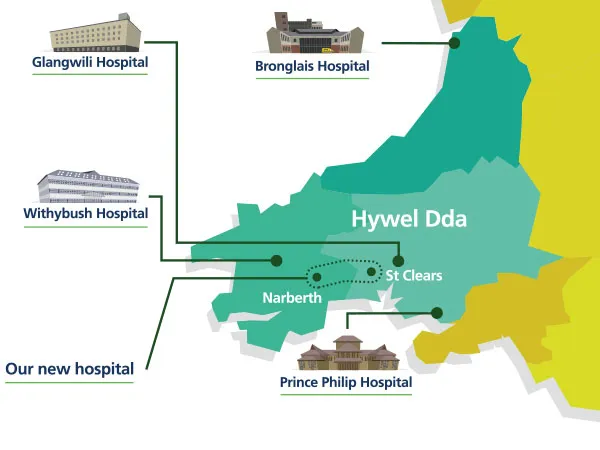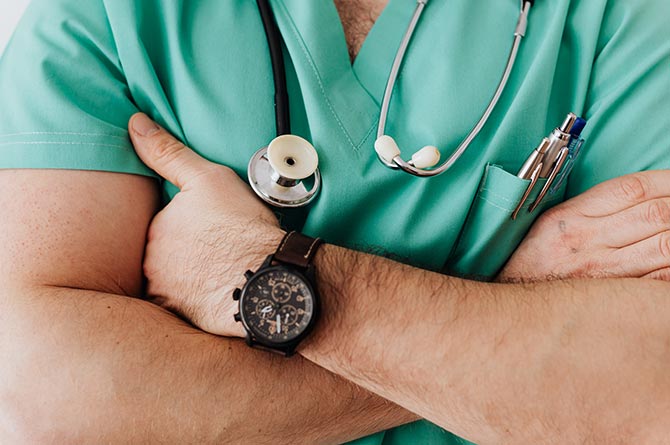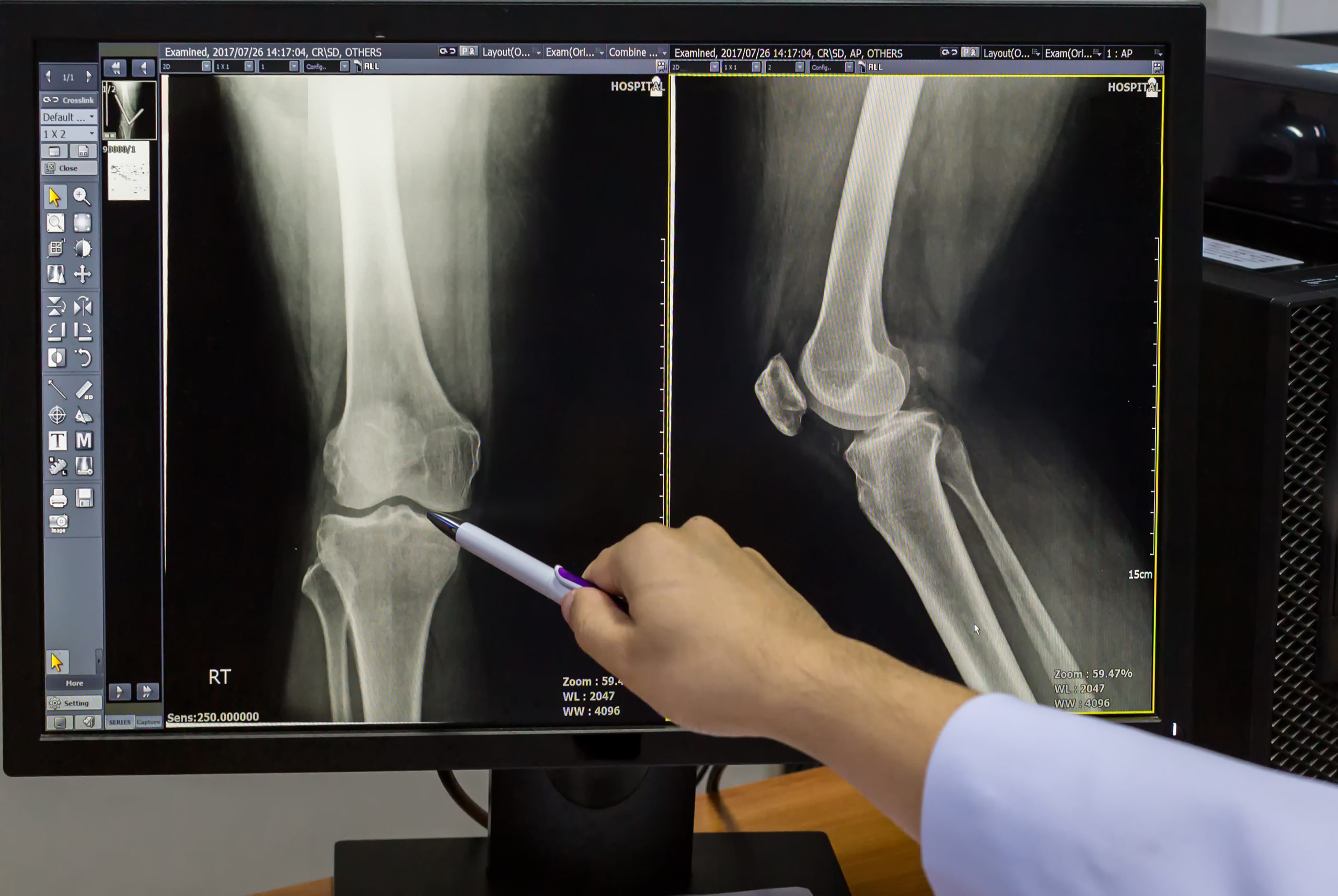Health
New hospital for west Wales faces delays due to funding issues

A LONG-PLANNED new hospital for west Wales faces significant delays due to funding challenges, Hywel Dda University Health Board’s chief executive, Phil Kloer, has revealed. Originally slated for completion by 2029, the project may now take at least a decade—or longer—to materialise.
The proposed hospital, intended to serve as part of a wider transformation of healthcare in the region, had two potential locations identified after extensive public consultation: St Clears and Whitland in Carmarthenshire. However, the rising cost of construction, driven by inflation, has forced the health board to revisit its strategy.
Rising costs and strategic reassessment
A report presented by the health board highlights that the estimated costs of the original strategy—outlined in a request for £1.3 billion from the Welsh Government—have surged significantly. The strategy aimed to overhaul healthcare services by developing community hubs, refreshing Prince Philip Hospital in Llanelli and Hospital in Aberystwyth, repurposing Withybush General Hospital in Haverfordwest and Glangwili General Hospital in Carmarthen, and constructing the new hospital.


Acknowledging the impact of inflation and other factors, Mr. Kloer told a health board meeting: “It would be wrong to plough on with the same thinking.” He cited the effects of Covid-19, demographic shifts, and climate change as additional reasons to “refresh” the health board’s approach.
Phased implementation to manage costs
Executive Director of Strategy and Planning Lee Davies presented a paper indicating that while a phased implementation might increase the overall costs of the programme, it could make the project “more affordable for the Welsh Government” over time. The health board also acknowledged that reviewing the hospital’s location could be necessary, despite previous public consultations narrowing options to two shortlisted sites.

Financial struggles and politics compound challenges
The health board’s financial difficulties add another layer of complexity to the hospital’s future. At the same meeting, it was confirmed that the board is grappling with a £64 million deficit, despite delivering £32.4 million in savings.
The delay raises questions about the future configuration of health services in west Wales and underscores the financial and logistical hurdles facing ambitious infrastructure projects in the region.
The delays have reignited political tensions in June this year, with Welsh Health Minister Eluned Morgan (as she was then) laying blame on Conservative politicians for obstructing progress. During a Welsh Parliament session she accused the Conservatives of leading a campaign against a new hospital years ago, which she claimed delayed its construction.
Speaking in response to a question from Pembrokeshire’s Sam Kurtz MS about the ongoing delays, Baroness Morgan said: “If you [the Conservatives] hadn’t led a campaign against the West Wales hospital, it would’ve been up and running by now. The Conservatives must take their share of responsibility for the fact there is not already a West Wales hospital.”
Morgan’s remarks were met with sharp criticism from veteran campaigners and opposition politicians. Dr Chris Overton, a prominent campaigner for Withybush Hospital, called the comments “rubbish,” pointing out that the campaign to save services at Withybush Hospital drew support from across the political spectrum, including members of the Labour Party and non-affiliated community members.
“The reality,” Dr Overton said, “is that Labour has been in power in Wales for 25 years. They’ve had plenty of time to build this hospital. Instead, they’ve salami-sliced services at Withybush to the point where trust in their promises is completely eroded.”
At that time Plaid Cymru candidate Cris Tomos and Liberal Democrat candidate Alistair Cameron both called for greater clarity and transparency from the Welsh Government. Tomos emphasized the need for genuine consultation with communities, while Cameron pointed out that residents face uncertainty about accessing services during the decade-long delay.
Covid an issue
Executive Director of Strategy and Planning Lee Davies said: “The pandemic and subsequent programme delays have meant the timescale for delivery of the programme, in particular the new hospital network, is substantially longer than originally anticipated. It is now highly likely that the new hospital would not be operational for at least a decade.
“In accepting that a new hospital will not be operational in the near future, it follows that the key service changes unlocked through a new hospital will now need to be considered ahead of a new facility and within existing hospitals.”
“Work to support fragile services in the interim of a new hospital has already begun through a programme of work called the Clinical Services Plan.”
“Staff, including clinicians, working with stakeholders and patient representatives have reviewed issues and challenges faced, agreed minimum standards, and developed draft options for nine fragile services.
“The nine services are Critical Care, Emergency General Surgery, Stroke, Endoscopy, Radiology, Dermatology, Ophthalmology, Orthopaedics and Urology. They are services which need change and support to continue safely providing care in the medium term.”
Board agreed that the programme prepares for a public consultation to involve further staff and communities in this work. The scope and matters for a future consultation, including the options, will be prepared for the next Health Board meeting at the end of January 2025.
Lee Davies added: “In the absence of a new hospital in the south of our area to address challenges, we need to consider other options to bring together some of our services. We anticipate the emerging model, informed by work on the Clinical Services Plan, will seek to build on the strengths of each of the hospital sites in a way that builds complementary areas of expertise.”
Health
Resident doctors in Wales vote to accept new contract

RESIDENT doctors across Wales have voted to accept a new contract, with 83% of those who took part in a referendum backing the agreement, according to BMA Cymru Wales.
The contract includes a four per cent additional investment in the resident doctor workforce and introduces a range of reforms aimed at improving training conditions, wellbeing and long-term workforce sustainability within NHS Wales. The BMA says the deal also supports progress towards pay restoration, which remains a central issue for doctors.
Key changes include new safeguards to limit the most fatiguing working patterns, measures intended to address medical unemployment and career progression concerns, and reforms to study budgets and study leave to improve access to training opportunities.
Negotiations between the BMA’s Welsh Resident Doctors Committee, NHS Wales Employers and the Welsh Government concluded earlier this year. Following a consultation period, a referendum of resident doctors and final-year medical students in Wales was held, resulting in a clear majority in favour of the proposals.
Welsh Resident Doctors Committee chair Dr Oba Babs Osibodu said the agreement marked a significant step forward for doctors working in Wales.
He said: “We’re proud to have negotiated this contract, which offers our colleagues and the future generation of doctors safer terms of service, fairer pay, and better prospects so that they can grow and develop their careers in Wales.
“This contract will help to retain the doctors already in training, and also attract more doctors to work in Wales, where they can offer their expertise and benefit patients.”
Dr Osibodu added that the BMA remains committed to achieving full pay restoration and acknowledged that challenges remain for some doctors.
“Whilst this contract sets the foundations for a brighter future for resident doctors in Wales, we recognise that there are still doctors who are struggling to develop their careers and secure permanent work,” he said. “We need to work with the Welsh Government and NHS employers to address training bottlenecks and underemployment.”
The Welsh Government has previously said it recognises the pressures facing resident doctors and the importance of improving recruitment and retention across NHS Wales, while also highlighting the need to balance pay agreements with wider NHS funding pressures and patient demand.
The new contract is expected to be phased in from August 2026. It will initially apply to doctors in foundation programmes, those in specialty training with unbanded rotas, and new starters, before being rolled out to all resident doctors across Wales.
Health
NHS Wales spends more than £15.5m on agency radiographers as pressures grow

NHS WALES has spent more than £15.5 million on agency radiography staff over the past five years, as mounting pressure on diagnostic imaging services raises concerns about long-term workforce sustainability.
Figures obtained by the Welsh Liberal Democrats through Freedom of Information requests show that spending on temporary radiographers almost doubled between 2020/21 and 2023/24, despite relatively low headline vacancy rates across Welsh health boards.
Radiographers carry out X-rays, CT, MRI and ultrasound scans, which are essential to emergency care, cancer diagnosis, trauma treatment and elective surgery. Delays or shortages in imaging services can have a knock-on effect across patient pathways, slowing diagnosis and treatment.
The data also highlights an ageing workforce. More than a quarter of radiographers in Wales are aged over 50, with more than one in ten aged 55 or above. In some health boards, a significantly higher proportion of staff are approaching retirement age, raising concerns that experienced radiographers could leave faster than they can be replaced.
Betsi Cadwaladr University Health Board recorded the highest agency spend, at more than £8.1m over the period covered by the FOI requests. Other health boards also reported growing reliance on temporary staff to maintain services, particularly where specialist skills are required.
While official vacancy figures remain comparatively low, professional bodies have previously warned that vacancy data does not always reflect pressure on services, as posts can be held open or covered through overtime and agency staff rather than filled permanently.
Diagnostic imaging demand has increased steadily in recent years, driven by an ageing population, advances in medical imaging technology, and rising referrals linked to cancer and long-term conditions.
Commenting on the findings, Welsh Liberal Democrat Leader Jane Dodds MS said:
“Radiographers are absolutely vital to the NHS. From diagnosing cancer to treating people in A&E, the vast majority of patient journeys depend on timely access to scans.
“These figures show a system increasingly relying on expensive agency staff while failing to plan properly for the future workforce. That is not fair on patients, and it is not fair on staff who are already under huge pressure.
“The Welsh Labour Government must take urgent action to improve recruitment and retention, support experienced staff to stay in the workforce for longer, and ensure NHS Wales has a sustainable radiography workforce fit for the future.”
The Welsh Government has previously said it is working with health boards to improve recruitment and retention across NHS Wales, including expanding training places and supporting flexible working arrangements to help retain experienced staff. Ministers have also pointed to record numbers of staff working in the NHS overall, while acknowledging ongoing challenges in hard-to-recruit specialties.
However, opposition parties and professional bodies continue to warn that without long-term workforce planning, reliance on agency staff could increase further, adding to costs and pressure on already stretched diagnostic services.
Health
‘Children spending more time in digital worlds than the real one’

CHILDREN are spending more time in digital worlds than the real one, the Senedd has heard, with excessive screen use shaping behaviour and health in ways society cannot ignore.
Labour’s John Griffiths expressed concerns about the impact of smartphones and online gaming on young people amid an “epidemic of screen use” in Wales.
Mr Griffiths titled the debate “Locked in, Bruh!” – “the state of playing a video game while oblivious to anything else” – on the suggestion of Tom, a teenager from Newport.
He raised research from the Centre for Social Justice, a thinktank, which estimates that up to 814,000 UK children aged three to five are already engaging with social media.
The Newport East Senedd Member told the chamber two-thirds of primary school pupils in Wales have their own smartphone by the age of 11.
Mr Griffiths said boys spend two hours more a day on online gaming while girls spend more time on social media and “reel scrolling” which has been linked to damaging self-esteem.
He told Senedd Members: “Boys are becoming more short-tempered and violent when exposed to violent video games and there is, rightly, much concern that children in more deprived families are particularly vulnerable.”
Mr Griffiths, who was first elected in 1999 and will stand down in 2026, said children aged five to 16 spend at least six hours a day looking at a screen. He added that for children, aged 11 to 14, that figure rises to nine hours a day.
He pointed to research showing more than 70% of young people in the UK do not undertake an hour of physical activity a day yet have at least six hours to spend looking at a screen.
He said: “Children are sat inside with a screen at the end of their nose and are not spending time outside enjoying their local communities or playing and interacting with friends.”
Mr Griffiths warned of increasing levels of obesity and rising numbers of young people reporting vision problems, with one in three children globally now short-sighted.
He told the Senedd: “As for the mental health and wider social impacts, anxiety and depression are increasingly linked to excessive screen use as is sleep disruption – with social media interfering with rest and emotional development.”
He raised a New Zealand study of more than 6,000 children that found a correlation between excessive screen time and below-average performance in literacy and numeracy. He warned children have increasingly shortened attention spans and an inability to concentrate.
Mr Griffiths shared the case of his constituent, Danielle, who said her son becomes more aggressive and snappier after a significant time gaming. Lucy, another constituent, explained how her children find the endless reels on social media addictive.
“Once they start scrolling, it’s hard to break that cycle,” the Senedd Member said. “And when she and her husband take the devices away, it often results in tantrums and tears.”
Mr Griffiths raised the example of countries such as Australia, France and Italy which have introduced strict age checks and bans on social media for under 16s.
He acknowledged such a policy would need to come from the UK Government because powers over internet services are not devolved. But he said Wales has the authority to introduce measures through education policy on, for example, smartphones in schools.
The Tories’ Sam Rowlands warned algorithms are having a “sickening” effect on teenagers who are eight times more likely to act on self-harm urges when exposed to such content. “TikTok users with eating disorders receive over 4,000% more toxic content,” he warned.
Responding to Wednesday’s (December 17) debate, Jane Hutt recognised how so-called doom scrolling can have a detrimental impact on young people.
Wales’ social justice secretary said: “We are living through profound change. Childhood today is shaped by technology in ways that were unimaginable a generation ago… For many young people, screens, smartphones and online gaming are part of everyday life.”

-

 Crime2 days ago
Crime2 days agoMilford Haven man jailed after drunken attack on partner and police officers
-

 News5 days ago
News5 days agoDyfed-Powys Police launch major investigation after triple fatal crash
-

 Crime1 day ago
Crime1 day agoTeenager charged following rape allegation at Saundersfoot nightclub
-

 Crime2 days ago
Crime2 days agoMan charged with months of coercive control and assaults
-

 Crime3 days ago
Crime3 days agoMan sent to Crown Court over historic indecent assault allegations
-

 Crime5 days ago
Crime5 days agoMan spared jail after baseball bat incident in Milford Haven
-

 Crime3 days ago
Crime3 days agoMilford Haven man admits multiple offences after A477 incident
-

 Crime2 days ago
Crime2 days agoWoman ‘terrified in own home’ after ex breaches court order

































